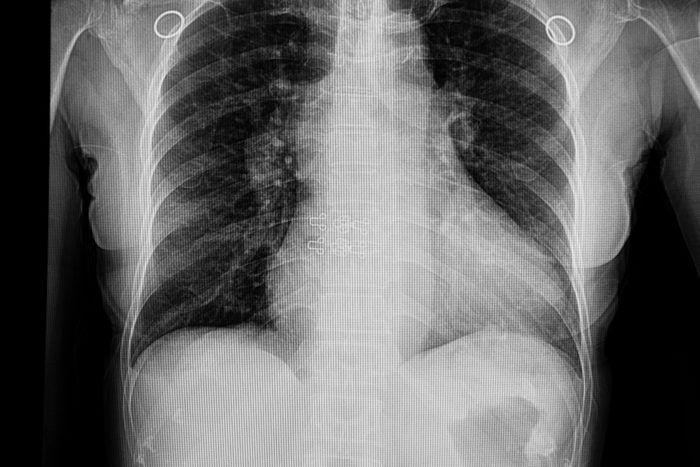
The hacking season
Winter is the prime time to get a nasty cough, when it can seem like everyone around you is hacking. If you’re the one doing the hacking, one of these natural cough remedies might help. Coughs are annoying, and sometimes they’re more than an inconvenience; they may signal a more serious health issue. Find out more about what’s causing your cough, and when you should be worried.

Your cough can last for a pretty long time
Coughs can linger, depending on the cause. You don’t necessarily need to see a doctor unless you’ve had it for over a month. “A majority of coughs are not dangerous,” says Jason C. Rho, MD, a pulmonologist at Northwestern Medicine Lake Forest Hospital. But if your cough lingers for more than 3 or 4 weeks—sooner if you have a fever—it’s time to see your doctor.

There are three major causes behind chronic coughing
When a cough persists for 8 weeks or longer or goes away only to come back, that’s a chronic cough. “Chronic coughs are a huge reason why patients go to see their primary care doctor. And, says Dr. Rho, “80 to 90 percent of chronic coughs are almost always due to three things:”
- Asthma (cough-variant asthma)
- Postnasal drip (upper airway cough syndrome)
- GERD/acid reflux
Here are other medical reasons for a persistent cough.

How to know if you have cough-variant asthma
What It Is: “Asthma occurs when something triggers the airways to get inflamed,” says Dr. Rho. “It is usually a dry cough that causes your airways to narrow. Symptoms can include a recurrent cough, wheezing, and shortness of breath.”
What Causes It: There are two causes of asthma: Allergies or a non-allergic response to stress, exercise, or illness.
Treatment: If you suspect that you have asthma, you may need to undergo breathing tests; your doctor may suggest you try out an inhaler.

You may have postnasal drip
What It Is: This is also known as upper airway cough syndrome. “It feels like exactly how it sounds—something may be dripping down from your nasal passage into the throat, constantly irritating your epiglottis and vocal cords and causing a cough,” says Dr. Rho. It may be a more wet cough, as your body is producing more mucus.
What Causes It: “It can be caused by a virus, bacterial sinusitis, or a number of allergies, including seasonal allergies like hay fever, that cause watery, itchy eyes, and a runny nose,” says Dr. Rho. These are the top reasons you can’t stop sneezing.
Treatment: There are a number of treatments for postnasal drip. “You can use a number of treatments, including nasal irrigation, saline rinses, or a Neti pot. There are many OTC nasal sprays, antihistamines (like Benadryl, Zyrtec, or Allegra). You could also use a nasal steroid like Flonase, says Dr. Rho.

You may have GERD
What It Is: It stands for gastroesophageal reflux disease; it’s basically persistent heartburn. “The stomach’s acid secretions can back up from your stomach into the esophagus, mouth, and epiglottis, and that triggers a cough,” says Dr. Rho. You may taste something sour in the back of your mouth or burning regurgitation.
What Causes It: Spicy or fried foods, caffeine, chocolate, alcohol, foods high in citrus, like some fruits and tomatoes. “You may also notice it if you lay down immediately after eating,” says Dr. Rho. “There’s another type called silent reflux, in which you reflux all the time regardless of eating.” Obesity, smoking, alcohol, large meals and a weakened lower esophageal sphincter (the valve that separates your stomach from your esophagus) along with older age can also contribute to GERD.
Treatment: Modify your diet by minimizing the foods that trigger symptoms, says Dr. Rho, and eat at least three hours before bedtime. OTC heartburn medications or prescription medications may also help. These are the foods people with GERD should avoid.

You may have the flu
What It Is: “Influenza (flu) is a virus that can cause a cough. With the flu, you may also experience systemic symptoms like intense body aches, fever, and fatigue,” says Rachel Taliercio, DO, a pulmonologist at the Cleveland Clinic. It will be a persistent cough.
What Causes It: Viral infections can irritate the nerve endings in your airways, and may lead to other upper respiratory infections.
Treatment: If the flu is diagnosed early, there are some medications available, such as Tamiflu,” says Dr. Taliercio. Here are 11 things you should do at the first sign of the flu.

You may have chronic bronchitis
What It Is: “Chronic bronchitis will sound like a wet productive cough,” says Dr. Taliercio.
What Causes It: “People that smoke or have a history of smoking are the most likely to have chronic bronchitis,” says Dr. Taliercio. It could also be caused by other air pollutants or dust.
Treatment: Your doctor may prescribe a bronchodilator medication or steroid, which work to relax and open your airways.

You may have pneumonia
What It Is: “Pneumonia is usually a wet cough with lots of mucus, and may cause breathlessness,” says Dr. Taliercio, and also may begin as an upper respiratory infection. Watch for these warning signs your upper respiratory infection is pneumonia.
What Causes It: Pneumonia is caused by an infection in the lungs that leads to the buildup of fluids in the chest, reports the Mayo Clinic.
Treatment: Your doctor can diagnose pneumonia with a chest x-ray. Bacterial pneumonia is usually treated with antibiotics, and in severe cases may require intravenous antibiotics,” says Dr. Taliercio.

You may have lung cancer
What It Is: “Lung cancer usually causes a chronic, persistent cough that may result in breathlessness. Patients may also cough up blood, which is never a normal sign and should always be met with medical care,” says Dr. Taliercio.
What Causes It: The main cause of lung cancer is smoking, says Dr. Taliercio. It may also be caused by exposure to radon, asbestos, or other pollutants, reports the Mayo Clinic.
Treatment: “Lung cancer is the most common cause of cancer mortality because symptoms usually occur too late to get curative treatment,” says Dr. Taliercio. However, treatment may include surgery, radiation, and/or chemotherapy. This man’s nagging cough turned out to be lung disease and this man’s lingering cough was a symptom of lung cancer.

Your medication may be the cause
What It Is: Certain medications, including common ones to treat high blood pressure, could be causing your cough. “These medications are called ACE inhibitors,” says Dr. Taliercio; they can trigger a dry cough similar to asthma.
What Causes It: This side effect occurs in about 10 percent of patients taking ACE inhibitors. “It has to do with the way the medication works by blocking certain receptors,” says Dr. Taliercio.
Treatment: “As soon as you stop taking the medication, the cough should go away,” says Dr. Taliercio. Don’t miss these bizarre side effects caused by common medications.

